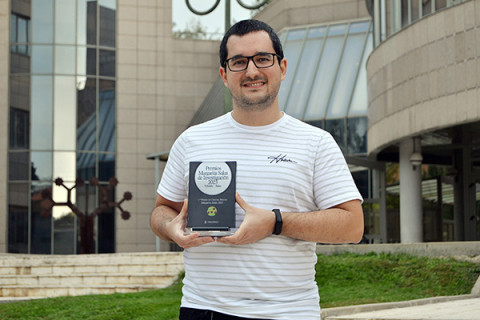Javier Gainza gets the Margarita Salas Award for his PhD in Basic Sciences

Javier Gainza, a postdoctoral researcher at the Materials Science Institute of Madrid (ICMM-CSIC), has won the First Margarita Salas Award for the best doctoral thesis in the category of Basic Sciences. "I still can't believe it," the young man said when he learned the news. The award recognizes the work he carried out during his doctoral thesis, which was supervised by José Antonio Alonso, along with Norbert Nemes and Federico Serrano, and had the title 'Thermoelectric Materials, Chalcogenides, and Pnictides, with New Phenomena: Synthesis and Characterization.'
"My work during the thesis has focused on what are known as thermoelectric materials, which are materials capable of directly and reversibly converting heat into electrical energy," explains the researcher. He points out that, although some of these materials are commercial, "their current application is very limited, mainly due to their low conversion efficiency."
In this context, Gainza has synthesized and studied different families of materials, such as SnSe and CoSb3, analyzing their atomic-level crystal structure using X-ray and neutron diffraction and their physical properties, "such as electrical conductivity or thermal conductivity." "Our ultimate goal was to understand the relationship between these properties in order to improve the material's efficiency and make this technology more widely applicable in the short term," concludes the scientist.
After achieving the highest distinction (Sobresaliente Cum Laude) in his thesis and winning the prestigious Margarita Salas award, the researcher currently works as a postdoctoral fellow at ICMM. However, his next step will be to join the European Synchrotron Radiation Facility (ESRF) in Grenoble, France, also as a postdoctoral researcher, starting in November. He has also applied for other notable postdoctoral contracts. "In any case, my intention is to continue in the scientific world, which I continue to enjoy, so I hope to return to ICMM in the medium term, where I have been very comfortable over the years."
When asked about the award, he expresses his happiness. "I'm really pleased that the jury has valued my work over the years so highly. It's undoubtedly an extra motivation that reaffirms the belief that all the effort has been worthwhile," he says excitedly and continues, "Did I expect it? Honestly, no! After seeing the finalists from last year, I had an idea that the level was very high. Being among the best theses of the year in this edition is certainly an honor that I highly appreciate."
"I believe that these awards serve to highlight all the scientific work that often goes unnoticed by the general public but is essential for the advancement of society," emphasizes the researcher, also expressing his gratitude that the award organized by the City of Madrid is aimed at young people who are starting their scientific careers: "This recognizes the effort and dedication required in this professional stage," he concludes.
Instituto de Ciencia de Materiales de Madrid (ICMM)
Sor Juana Ines de la Cruz, 3
Cantoblanco, 28049
Madrid, España
Telephone: (+34) 91 334 90 00
Email: @email
Communication Office: @email

Acknowledge the Severo Ochoa Centres of Excellence program through Grant CEX2024-001445-S/ financiado por MICIU/AEI / 10.13039/501100011033

Contacto | Accesibilidad | Aviso legal | Política de Cookies | Protección de datos
